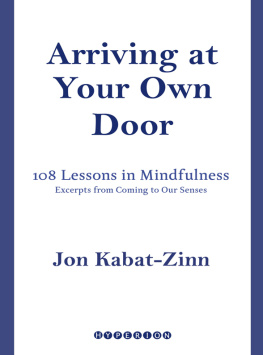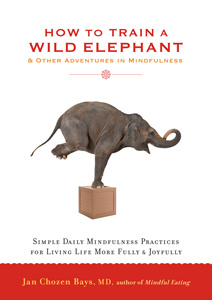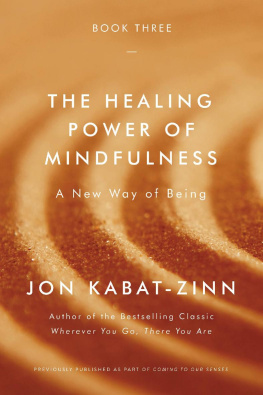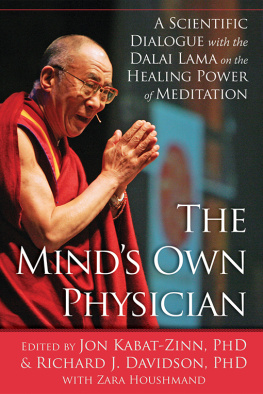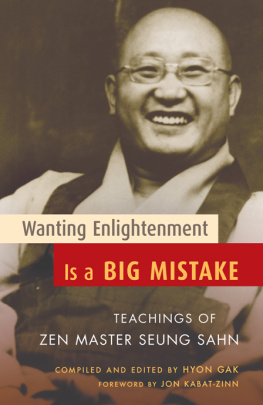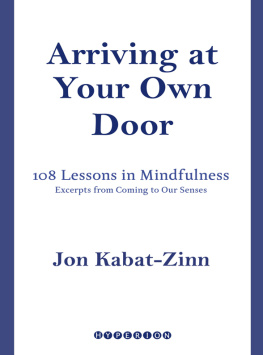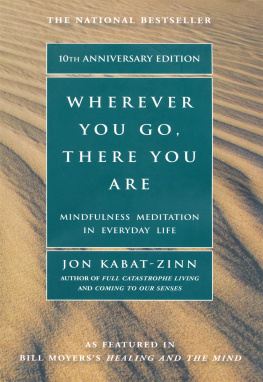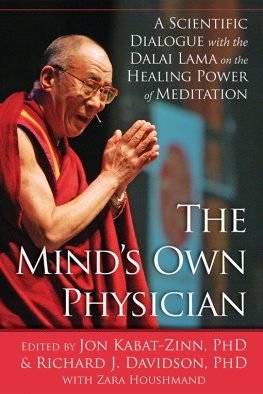Kabat-Zinn - Arriving at Your Own Door
Here you can read online Kabat-Zinn - Arriving at Your Own Door full text of the book (entire story) in english for free. Download pdf and epub, get meaning, cover and reviews about this ebook. year: 2007, publisher: Hyperion, genre: Home and family. Description of the work, (preface) as well as reviews are available. Best literature library LitArk.com created for fans of good reading and offers a wide selection of genres:
Romance novel
Science fiction
Adventure
Detective
Science
History
Home and family
Prose
Art
Politics
Computer
Non-fiction
Religion
Business
Children
Humor
Choose a favorite category and find really read worthwhile books. Enjoy immersion in the world of imagination, feel the emotions of the characters or learn something new for yourself, make an fascinating discovery.
- Book:Arriving at Your Own Door
- Author:
- Publisher:Hyperion
- Genre:
- Year:2007
- Rating:5 / 5
- Favourites:Add to favourites
- Your mark:
- 100
- 1
- 2
- 3
- 4
- 5
Arriving at Your Own Door: summary, description and annotation
We offer to read an annotation, description, summary or preface (depends on what the author of the book "Arriving at Your Own Door" wrote himself). If you haven't found the necessary information about the book — write in the comments, we will try to find it.
Kabat-Zinn: author's other books
Who wrote Arriving at Your Own Door? Find out the surname, the name of the author of the book and a list of all author's works by series.
Arriving at Your Own Door — read online for free the complete book (whole text) full work
Below is the text of the book, divided by pages. System saving the place of the last page read, allows you to conveniently read the book "Arriving at Your Own Door" online for free, without having to search again every time where you left off. Put a bookmark, and you can go to the page where you finished reading at any time.
Font size:
Interval:
Bookmark:

Arriving At Your Own Door
108 Lessons in Mindfulness
JON KABAT-ZINN
Excerpts from Coming to Our Senses
Compiled by Hor Tuck Loon and Jon Kabat-Zinn

I often catch myself feeling that language has intrinsic limitations that frustrate my impulse to fully express my feelings, my passing thoughts and insights, in a word, my experience. Words cannot, and probably will never, replace the richness of lifeno matter how articulately or artfully they are conveyed. In the past, it has been said that meditation teachers sometimes transmitted their knowledge to their students through mental telepathy to avoid misinterpretations. Exceptionally few have managed to capture the essence of their message through writing.
Jon Kabat-Zinns Coming to Our Senses bears such testimony. Jon seems to be able to drop words right into our hearts, where they can resonate and reinforce our very being and well-being. Every subject that he touches upon suggests an in-depth meaning and perspective on our personal journey that we may not have felt or expressed as clearly or convincingly, even to ourselves. As one example, the use of the word Heartfulness, as synonymous with mindfulness in Jons language, can offer up new and expanded ways of understanding and experiencing peace in ones own life and in the world.
Jons work is to be savored slowly, as in the art of tea drinking ceremony. It is to be relished in every aspect: in the here and nowas mindfulness teaches us. In moments of unhurriedness and non-judgment, freed if only briefly from the ruts of habitual thinking, the truth in his language and what it is pointing to can touch our hearts. In moments of stillness and silent introspection, the wisdom inside and underneath his words gives purpose and hope to the world.
If not for Jons editorial oversight and discipline, this little book would have ended up with 300 longer quotes, which I religiously culled while reading Coming to Our Senses. I would have maintained them as they were because I felt them to be of great benefit to many. However, I am certain that when this strong distillation of the entire book arrives in your hands, your legs and your heart will invariably and uncannily, yet mindfully and eagerly, lead you to explore in depth the complete version of Coming to Our Senses. My utmost respect and gratitude to Jon and also Zareen Jaffery of Hyperion for their passionate work.
Hor Tuck Loon
The time will come
when, with elation,
you will greet yourself arriving
at your own door, in your own mirror,
and each will smile at the others welcome,
and say, sit here. Eat.
You will love again the stranger who was your self.
Give wine. Give bread. Give back your heart
to itself, to the stranger who has loved you
all your life, whom you ignored
for another, who knows you by heart.
Take down the love letters from the bookshelf,
the photographs, the desperate notes,
peel your own image from the mirror.
Sit. Feast on your life.
Derek Walcott, Love after Love
Mindfulness is moment-to-moment, non-judgmental awareness, cultivated by paying attention. Mindfulness arises naturally from living. It can be strengthened through practice. This practice is sometimes called meditation. But meditation is not what you think.
Meditation is really about paying attention, and the only way in which we can pay attention is through our senses, all of them, including the mind. Mindfulness is a way of befriending ourselves and our experience. Of course, our experience is vast, and includes our own body, our mind, our heart, and the entire world.
In Asian languages, the word for mind and the word for heart are the same word. So when we hear the word mindfulness, we have to inwardly also hear heartfulness in order to grasp it even as a concept, and especially as a way of being.
Many people are first drawn to the practice of mindfulness because of stress or pain of one kind or another and their dissatisfaction with elements of their lives that they somehow sense might be set right through the gentle ministrations of direct observation, inquiry, and self-compassion. Stress and pain thus become potentially valuable portals and motivators through which to enter the practice.
One scholar described mindfulness as the unfailing master key for knowing the mind, and thus the starting point; the perfect tool for shaping the mind, and thus the focal point; and the lofty manifestation of the achieved freedom of the mind, and thus the culminating point. Not bad for something that basically boils down to paying attention.
Mindfulness has been called the heart of Buddhist meditation. Even so, there is nothing particularly Buddhist about attention or awareness. The essence of mindfulness is truly universal. It has more to do with the nature of the human mind than it does with ideology, beliefs, or culture. It has more to do with our capacity for knowing, with what is called sentience, than with a particular religion, philosophy, or view.
The Buddha once said that the core message of all his teachings could be summed up in one sentence. On the off chance that that is so, it might not be a bad idea to commit that sentence to memory. You never know when it might come in handy, when it might make sense to you, even though it didnt the moment before. That sentence is: Nothing is to be clung to as I, me, or mine. In other words, no attachmentsespecially to fixed ideas of yourself and who you are.
When mindfulness is cultivated intentionally, it is sometimes referred to as deliberate mindfulness. When it is available to us spontaneously, as it tends to be more and more, the more it is cultivated intentionally, it is sometimes referred to as effortless mindfulness. Ultimately, however arrived at, mindfulness is mindfulness.
We take care of the future best by taking care of the present now.
In any given moment, we are either practicing mindfulness or, de facto, we are practicing mindlessness. When framed this way, we might want to take more responsibility for how we meet the world, inwardly and outwardly, in any and every moment.
Meditation is a way of being, not a technique. Meditation is not about trying to get anywhere else. It is about allowing yourself to be exactly where you are and as you are, and the world to be exactly as it is in this moment, as well.
That doesnt mean that your aspirations to effect positive change, make things different, improve your life and the lot of the world are inappropriate. Those are all very real possibilities. Just by sitting down and being still, you can change yourself and the world. In fact, just by sitting down and being still, in a small but not insignificant way, you already have.
Next pageFont size:
Interval:
Bookmark:
Similar books «Arriving at Your Own Door»
Look at similar books to Arriving at Your Own Door. We have selected literature similar in name and meaning in the hope of providing readers with more options to find new, interesting, not yet read works.
Discussion, reviews of the book Arriving at Your Own Door and just readers' own opinions. Leave your comments, write what you think about the work, its meaning or the main characters. Specify what exactly you liked and what you didn't like, and why you think so.

